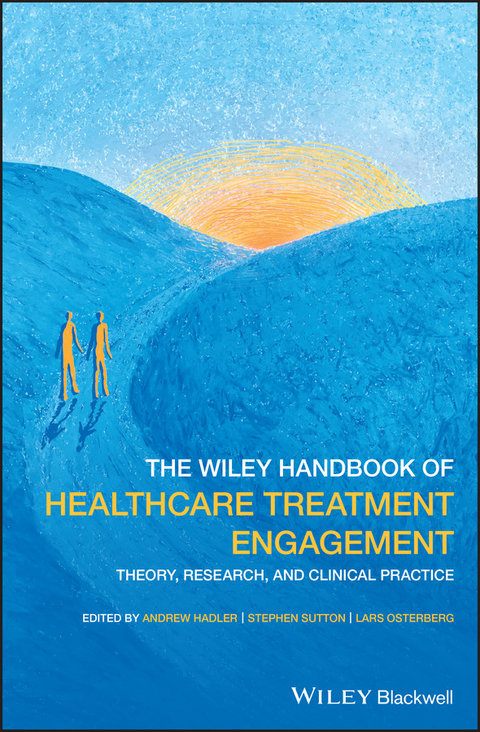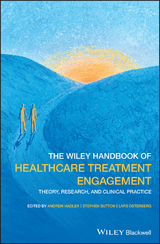The Wiley Handbook of Healthcare Treatment Engagement
Wiley-Blackwell (Verlag)
978-1-119-12949-3 (ISBN)
The »Wiley handbook of Healthcare Treatment Engagement« offers a guide to the theory, research and clinical practice of promoting patient engagement in healthcare treatment at individual, organizational and systems levels. The concept of treatment engagement, as explained within the text, promotes a broader view than the related concept of treatment adherence. Treatment engagement encompasses more readily the lifestyle factors which may impact healthcare outcomes as much as medication-taking, as well as practical, economic and cultural factors which may determine access to treatment.
Over a span of 32 chapters, an international panel of expert authors address this far-reaching and fascinating field, describing a broad range of evidence-based approaches which stand to improve clinical services and treatment outcomes, as well as the experience of users of healthcare service and practitioners alike.
This comprehensive volume adopts an interdisciplinary approach to offer an understanding of the factors governing our healthcare systems and the motivations and behaviors of patients, clinicians and organizations. Presented in a user-friendly format for quick reference, the text first supports the reader's understanding by exploring background topics such as the considerable impact of sub-optimal treatment adherence on healthcare outcomes, before describing practical clinical approaches to promote engagement in treatment, including chapters referring to specific patient populations. The text recognizes the support which may be required throughout the depth of each healthcare organization to promote patient engagement, and in the final section of the book, describes approaches to inform the development of healthcare services with which patients will be more likely to seek to engage.
This important book:
- Provides a comprehensive summary of practical approaches developed across a wide range of clinical settings, integrating research findings and clinical literature from a variety of disciplines
- Introduces and compliments existing approaches to improve communication in healthcare settings and promote patient choice in planning treatment
- Presents a range of proven clinical solutions that will appeal to those seeking to improve outcomes on a budget
Written for health professionals from all disciplines of clinical practice, as well as service planners and policy makers, The Wiley Handbook of Healthcare Treatment Engagement is a comprehensive guide for individual practitioners and organizations alike.
Andrew Hadler is a Consultant Forensic Psychiatrist with Sussex Partnership NHS Foundation Trust, UK and Honorary Lecturer at Brighton and Sussex Medical School.
Stephen Sutton is Professor of Behavioural Science and Head of the Behavioural Science Group at the Institute of Public Health, University of Cambridge, UK.
Lars Osterberg is Associate Professor (Teaching) at Stanford University School of Medicine, USA, and a Staff Physician at the Veterans Administration Palo Alto Health Care System.
Foreword viii
Preface x
Notes on Authors xiii
Notes on Contributors xiv
Acknowledgments xxv
Introduction 1
Section I Background 15
1 Treatment Engagement and Adherence: A Review of the Literature 17
Christiana O. Oshotse, Hayden Barry Bosworth, and Leah L. Zullig
2 What Do Patients Want? Patient Satisfaction and Treatment Engagement 33
Ann E. Webb and Robin E. Gearing
3 Values?based Practice and Patient Engagement: Linking Science with People 58
Bill (K.W.M.) Fulford
4 Informed Consent and the Law: From Patient Compliance to Patient Engagement? 75
Richard Huxtable
5 Assessing, Measuring, and Monitoring Treatment Engagement 92
Donald E. Morisky and Chia?Hsin Emily Cheng
Section II Understanding Treatment Engagement 109
6 Addressing the Challenges of Neurocognitive Impairment (NCI) on Treatment Engagement 111
Roman Shrestha, Pramila Karki, and Michael Copenhaver
7 Self?determination Theory and Autonomy Support to Change Healthcare Behavior 141
Martin S. Hagger and Cleo Protogerou
8 Attachment Theory, the Therapeutic Alliance, and Treatment Engagement 159
Katherine Berry and Adam Danquah
9 Clinical Case Formulation of Suboptimal Engagement 172
Lawrence Jones and Sunita Guha
10 The Contribution of Beliefs to Treatment Engagement 188
Vivian Auyeung, Lyndsay D. Hughes, and John A. Weinman
Section III Practical Approaches to Enhance Engagement 203
11 Medication and Treatment Beliefs as Determinants of Treatment Engagement 205
Rob Horne
12 Cognitive Behavioral and eHealth Approaches to Promote Engagement in Treatment 223
M. Bryant Howren, Anne I. Roche, and Alan J. Christensen
13 Enhancing Treatment Engagement Through Motivational Interviewing 243
Stanley R. Steindl and Jason P. Connor
14 Positive Approaches to Promote and Support Changes in Health Behavior 259
Emily G. Lattie and Anne Cohen
15 Communication Skills to Engage Patients in Treatment 274
Mollie A. Ruben, Danielle Blanch?Hartigan, and Judith A. Hall
16 Understanding Some Psychodynamic Factors Involved in Suboptimal Engagement 297
Geoffrey P. Taylor and Deborah L. Cabaniss
17 Enhancing Wellbeing and Motivation for Staff Working with Patients Who Have Inconsistent or Challenging Engagement in Services 313
Alex Lord
Section IV Treatment Engagement in Specific Client Groups 335
18 Engaging Patients from Diverse Backgrounds in Healthcare Treatment 337
Aswita Tan?McGrory, Andrea O. Madu, Karey S. Kenst, and Joseph R. Betancourt
19 Enhancing Treatment Adherence in Young People with Chronic Diseases 354
Michael A. Rapoff and Ali Calkins?Smith
20 Enhancing Treatment Engagement in Older Adults 365
Jo Anne Sirey and Patricia Marino
21 Treatment Engagement and People with Intellectual Disability 381
Roger J. Stancliffe, Seeta Durvasula, Nathan J. Wilson, and Peter Lewis
22 Promoting and Maintaining Engagement in Substance Abuse Treatment 399
Nikolaj Kunoe
23 Working with People with Mental Health Difficulties to Improve Adherence to Medication 430
Thomas R.E. Barnes and Peter M. Haddad
24 Engaging Socially Excluded Individuals and Communities in Healthcare 455
Jed Boardman and David Morris
25 Understanding and Overcoming Barriers to Treatment Engagement in Lower?income Countries 477
Andrew L. Ellner, Jessica L. Alpert, Chris Desmond, and Ashwin Vasan
Section V Designing and Delivering Services to Optimize Patient Engagement 503
26 Treatment Engagement: The Experience of Users of Health Services 505
Dolly Sen
27 Recovery from Ill Health from an Occupational Perspective 515
Wendy Bryant and Maggie Winchcombe
28 Achieving Patient Engagement Through Shared Decision?making 531
Paul Barr, Glyn Elwyn, and Isabelle Scholl
29 Optimizing Service Delivery to Enhance Treatment Engagement 551
Sharon Lawn
30 Patient Engagement in Treatment in an Information Age 568
Fiona Stevenson and Maureen Seguin
31 Governing by Risk, or Why Interventions to Improve Health Fail 582
Paul Crawshaw
Afterword: Future Directions 597
Index 602
| Erscheinungsdatum | 30.12.2019 |
|---|---|
| Verlagsort | Hoboken |
| Sprache | englisch |
| Maße | 177 x 243 mm |
| Gewicht | 1240 g |
| Einbandart | gebunden |
| Themenwelt | Geisteswissenschaften ► Psychologie |
| Studium ► Querschnittsbereiche ► Prävention / Gesundheitsförderung | |
| ISBN-10 | 1-119-12949-4 / 1119129494 |
| ISBN-13 | 978-1-119-12949-3 / 9781119129493 |
| Zustand | Neuware |
| Informationen gemäß Produktsicherheitsverordnung (GPSR) | |
| Haben Sie eine Frage zum Produkt? |
aus dem Bereich




